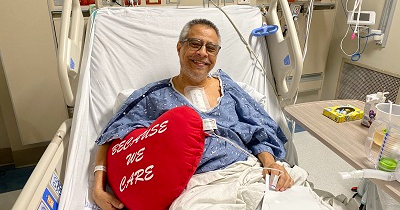Living heroes, living donors gift life to kidney transplant patients
MIAMI - Chronic Kidney Disease impacts nearly 1 in 7 US adults, with roughly 90% of people not even knowing they have it.
As our population ages, risk factors like diabetes have become increasingly prevalent and require advanced kidney treatment such as dialysis and transplant.
Patients with kidney failure have two options when it comes to receiving a transplant.
Deceased Donors: This type of transplant uses an organ from a deceased donor. Everyone eligible for a kidney transplant go on a national waitlist. This list matches donors with individuals based on criteria such as the severity of their condition. Unfortunately, there are more people in need of a kidney than available organs, most people wait nearly 3 years for a deceased donor kidney.
Living Kidney Donor Transplant: When possible, this option is preferred by doctors. A living kidney donor kidney could function for two times longer than an organ from a deceased donor.
Memorial Transplant Institute's Heather LaGuardia, MD, Medical Director of Living Donation, explains how our body responds to losing a kidney, "We know that we can take a kidney out and you'll lose a little bit of function. But if you have a strong, healthy kidney beforehand, the remaining kidney is going to adapt. You won't even know you just have one kidney."
In South Florida, Memorial Transplant Institute is on the front lines, treating kidney disease and increasing positive outcomes for patients in need of life-saving transplants.
Memorial is the only transplant program in Broward County that performs kidney transplants for both children and adults. It is also 1 of only 100 centers in the U.S. and 1 of 4 in Florida on the National Kidney Registry.
In 2022, the Scientific Registry of Transplant Recipients reported that Memorial has one of the shortest times to transplant and the highest kidney transplant rates in Florida.
Are you thinking about becoming a living donor?
Memorial Transplant Institute's living donor team includes experienced nurses called living donor coordinators. They help guide potential donors through the donation process, including a medical screening process to identify donors that meet the criteria for donation. Donor evaluation testing includes;
- Blood tests to determine how the recipient will react to your organ.
- Medical tests such as urine collection, EKG, and advanced imaging such as CT or MRI.
- Psychosocial assessment
For more information on kidney transplantation at Memorial Healthcare System, visit





